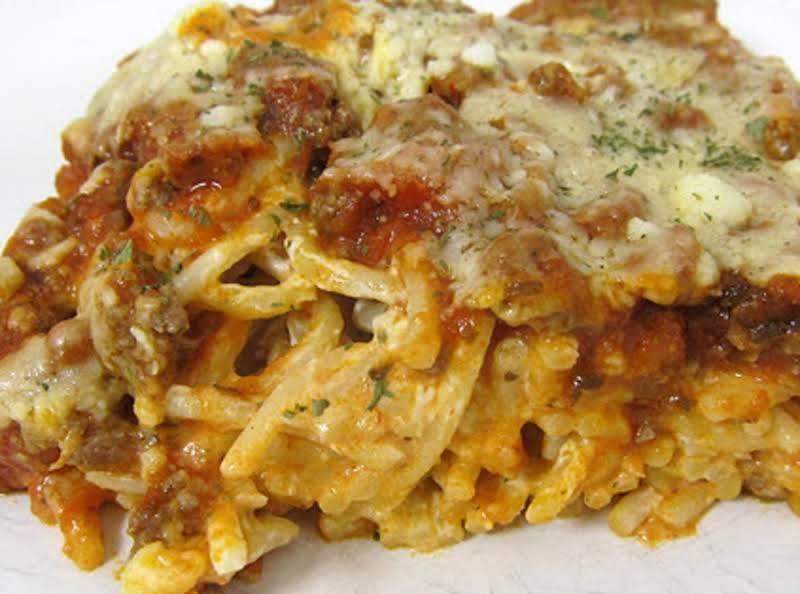- Add the cooked spaghetti to the skillet with the creamy sauce. Toss to coat the spaghetti evenly.
- If your skillet is oven-safe, you can leave the mixture in the skillet. If not, transfer it to a greased 9×13-inch baking dish.
Step 5: Add the Cheese Topping
- Sprinkle the shredded mozzarella cheese evenly over the top of the spaghetti.
Step 6: Bake and Serve
- Place the baking dish in the preheated oven and bake for about 25-30 minutes, or until the cheese is melted and bubbly, and the edges are slightly golden.
- Remove from the oven and let it rest for a few minutes before serving.
Step 7: Garnish and Enjoy
- If desired, garnish the Baked Cream Cheese Spaghetti with fresh basil leaves before serving.
- Serve warm and enjoy!
Tips and Variations:
- You can customize this dish by adding vegetables like sautéed mushrooms, bell peppers, or spinach to the sauce for extra flavor and nutrition.
- For a spicy kick, add crushed red pepper flakes or diced jalapeños to the sauce.
- Experiment with different types of cheese, such as cheddar or Parmesan, for the topping to suit your taste preferences.
- Substitute ground beef or turkey with ground chicken or pork for variation.
- Make it vegetarian by using meatless crumbles or tofu instead of meat.
- If you prefer a lighter version, you can use low-fat cream cheese and sour cream.
Conclusion:
Baked Cream Cheese Spaghetti is a delightful and creamy pasta dish that’s sure to become a family favorite. It’s simple to make, packed with flavor, and perfect for both weeknight dinners and special occasions. Enjoy the comforting combination of creamy sauce, melted cheese, and tender spaghetti in every bite of this delicious casserole!
Here’s an approximate breakdown of the nutrition information for one serving of Baked Cream Cheese Spaghetti (based on a yield of 8 servings):
Calories: Approximately 450-500 calories per serving.
Protein: About 20-25 grams of protein per serving, mainly from the ground beef or turkey and dairy ingredients.
Carbohydrates: Approximately 35-40 grams of carbohydrates per serving, primarily from the spaghetti and sauce.
Dietary Fiber: Roughly 2-3 grams of dietary fiber per serving, depending on the pasta used.
Sugars: Approximately 6-8 grams of sugar per serving, mainly from natural sugars in the marinara sauce and dairy ingredients.
Fats: Approximately 25-30 grams of total fat per serving, with most of it coming from the ground meat, cheese, cream cheese, and sour cream.
Saturated Fat: Around 12-15 grams of saturated fat per serving, primarily from the dairy and meat.
Cholesterol: Approximately 85-100 milligrams of cholesterol per serving, primarily from the ground meat and dairy products.
Sodium: Roughly 700-800 milligrams of sodium per serving, with variations based on the salt content of the ingredients used.
Vitamins and Minerals: The dish provides some essential nutrients, including calcium from the dairy products, iron from the ground meat, and various vitamins and minerals from the sauce and pasta.
Note: These nutritional values are approximate and can vary based on factors like specific brands of ingredients, portion sizes, and individual variations in recipes. It’s essential to adjust the serving size and ingredients to meet your dietary needs and preferences.
Baked Cream Cheese Spaghetti is a delicious comfort food option, but it’s relatively high in calories, saturated fat, and sodium. Therefore, it’s advisable to enjoy it in moderation, especially if you’re watching your calorie and fat intake. You can make slight adjustments to the recipe to make it lighter, such as using lean ground meat or reducing the amount of cheese and dairy products.
ADVERTISEMENT

